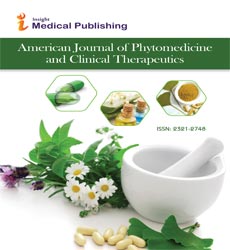ISSN : 2321-2748
American Journal of Phytomedicine and Clinical Therapeutics
Herbal Remedies' Potential as a Cutting-Edge Method of Treating Sepsis
Supriya Mandal*
Department of Health Sciences, Presidency University, West Bengal, India
- *Corresponding Author:
- Supriya Mandal
Department of Health Sciences,
Presidency University, West Bengal,
India,
E-mail: supriya53@gmail.com
Received date: November 09, 2023, Manuscript No. IPAPCT-24-18560; Editor assigned date: November 12, 2023, PreQC No. IPAPCT-24-18560 (PQ); Reviewed date: November 26, 2023, QC No. IPAPCT-24-18560; Revised date: December 02, 2023, Manuscript No. IPAPCT-24-18560 (R); Published date: December 09, 2023, DOI: 10.36648/2321-2748.11.5.269
Citation: Mandal S (2023) Herbal Remedies' Potential as a Cutting-Edge Method of Treating Sepsis. Am J Phytomed Clin Ther Vol.11 No.5: 269.
Introduction
Sepsis, a life-threatening condition triggered by the body's overwhelming response to infection, remains a critical concern in the medical field. Despite advancements in modern medicine, the treatment of sepsis continues to present challenges, often requiring an integrated and multifaceted approach. Recently, attention has turned towards exploring the potential of herbal remedies as a cutting-edge method in managing and treating sepsis. The urgency to discover innovative therapeutic strategies has led researchers to explore unconventional approaches, including the potential utilization of herbal remedies, which hold promise as a cutting-edge method in the treatment of sepsis. Understanding the gravity of sepsis requires acknowledging its multifaceted nature. Characterized by an overwhelming immune response, sepsis progresses swiftly, potentially leading to organ dysfunction or failure, necessitating immediate and comprehensive medical intervention. While conventional treatments such as antibiotics, intravenous fluids, and organ support have been fundamental in managing sepsis, the high mortality rates and persistent challenges in addressing its complexities emphasize the critical need for novel therapeutic avenues. Amidst this backdrop, traditional herbal medicine, rooted in centuries of empirical knowledge and natural remedies, has gained renewed attention for its potential in combating sepsis. Herbal remedies, derived from diverse plant sources.
Sepsis
Sepsis occurs when the body's immune response to infection becomes dysregulated, causing widespread inflammation that can lead to organ dysfunction or failure. This condition demands immediate medical attention and intensive care. Current treatment approaches primarily involve antibiotics, fluid resuscitation, and organ support. However, sepsis mortality rates remain high, prompting researchers to seek innovative therapeutic strategies. Sepsis is a life-threatening condition that arises when the body's response to an infection spirals out of control. Typically triggered by bacterial, viral, fungal, or parasitic infections, sepsis initiates an exaggerated immune response, causing widespread inflammation and potentially leading to tissue damage, organ failure, and death if not promptly treated. As the body's immune response intensifies, an imbalance occurs, leading to systemic inflammation. Symptoms of sepsis can include fever, elevated heart rate, rapid breathing, and altered mental status. Laboratory tests might reveal abnormalities such as an increased white blood cell count or signs of organ dysfunction. In severe cases, sepsis progresses to severe sepsis or septic shock. Severe sepsis occurs when organ dysfunction, such as kidney, heart, or lung failure, becomes evident. Septic shock is the most critical stage, marked by a significant drop in blood pressure that doesn't respond adequately to fluid resuscitation.
Sepsis reatment
Herbal medicine, an ancient practice, involves using plantbased materials to prevent and treat various illnesses. The rich repertoire of bioactive compounds present in herbs has garnered interest in their potential role in managing sepsis. Several herbs possess antimicrobial, anti-inflammatory, and immunomodulatory properties, making them a promising area of study for sepsis treatment. Research indicates its potential in reducing the severity of sepsis by modulating the immune response and decreasing inflammatory markers. Turmeric, known for its active compound curcumin, exhibits antiinflammatory and antioxidant properties. Studies suggest that curcumin may attenuate sepsis-induced organ damage by inhibiting inflammatory pathways demonstrates immunomodulatory effects that could potentially mitigate the systemic inflammation seen in sepsis, thus improving outcomes. Widely recognized for its immune-stimulating properties. Research suggests that these compounds may help regulate the immune response, reducing the severity of sepsis by modulating inflammatory cytokines and enhancing immune cell activity. Curcumin, the primary bioactive compound in turmeric, possesses potent anti-inflammatory and antioxidant properties. Studies have indicated its potential in mitigating sepsis-induced inflammation and tissue damage by inhibiting key inflammatory pathways and oxidative stress mechanisms. Known for its adaptogenic and immunomodulatory effects, these compounds have shown promise in preclinical studies by suppressing excessive inflammation and potentially mitigating organ damage in sepsis.

Open Access Journals
- Aquaculture & Veterinary Science
- Chemistry & Chemical Sciences
- Clinical Sciences
- Engineering
- General Science
- Genetics & Molecular Biology
- Health Care & Nursing
- Immunology & Microbiology
- Materials Science
- Mathematics & Physics
- Medical Sciences
- Neurology & Psychiatry
- Oncology & Cancer Science
- Pharmaceutical Sciences
